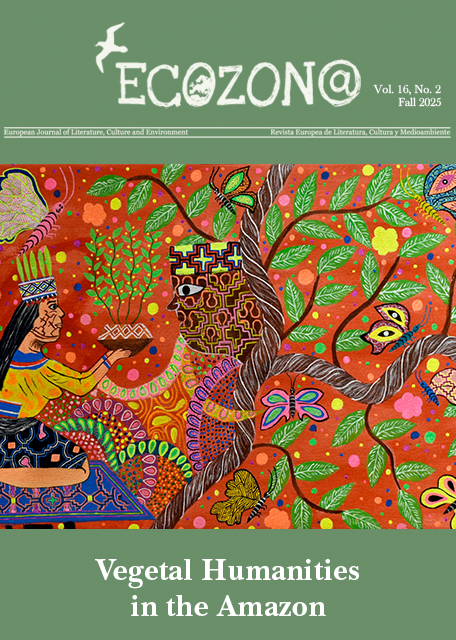Binding and Liberating: Recipes for Environmental Narratives
DOI:
https://doi.org/10.37536/ECOZONA.2023.14.2.4965Schlagworte:
recipes, Italian feminism, eco-narrativesAbstract
Crafting narratives alternative to dominant discourses of natural-cultural depletion is one of the signature goals of the ecocritical “test kitchen.” This culinary analogy highlights deeper similarities: both recipes and eco-narratives create symbolic and material connections between people and the environment, which, in turn, enable transformative practices. But how can we craft messages that are generative of positive processes of transformation? Or, put it differently, what are recipes for eco-narratives? This article proposes a versatile method to test what uses of language and dynamics elicited by texts might produce environmental action. The culinary experiment draws on Italian second-wave feminism, a theoretical “cuisine” that has engaged with language to rework dominant relationships to others and to the world. Feminist strategies, including the practice of “starting from oneself,” the reclaiming of the personal as political, and the retracing of alternative genealogies, have used language as a means simultaneously of liberation and of reconnection with the material, embodied world. This liberating binding is repurposed as a key technique to craft and identify effective eco-narratives. Here, feminist strategies intersect with the chemical and social operations of cooking through discussion of three recipes tied to the author’s Mediterranean origins: a milk pudding, eggless fresh pasta, and a type of ancient-grains bread. Through the processes of binding and softening, common to preparations that employ starch, the analysis demonstrates that a starchy language used both to bind (us to material life) and to soften (power structures) has enormous environmental potential. While primarily serving scholars in Italian studies and ecocriticism, this culinary method invites adaptations across food cultures and gender identities.
Downloads
Downloads
Veröffentlicht
Ausgabe
Rubrik
Lizenz
Authors who publish with this journal agree to the following terms:
a) Authors retain copyright and grant the journal right of first publication with the work simultaneously licensed under a Creative Commons Attribution License that allows others to share the work with an acknowledgement of the work's authorship and initial publication in this journal (CC BY-NC for articles and CC BY-NC-ND for creative work, unless author requests otherwise.
b) Authors are able to enter into separate, additional contractual arrangements for the non-exclusive distribution of the journal's published version of the work (e.g., post it to an institutional repository or publish it in a book), with an acknowledgement of its initial publication in this journal.
c) Authors are permitted and encouraged to post their work online (e.g., in institutional repositories or on their website) prior to and during the submission process, as it can lead to productive exchanges, as well as earlier and greater citation of published work (See The Effect of Open Access).










